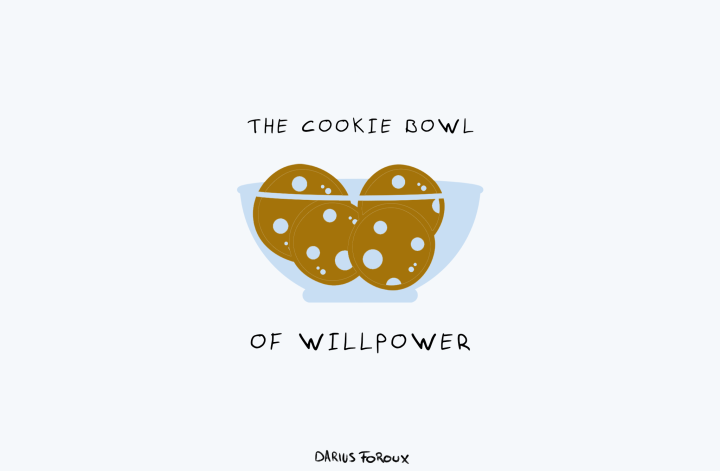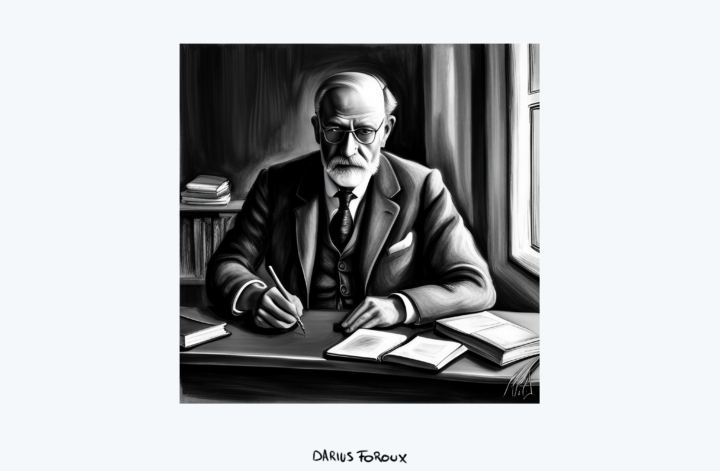Sometimes life is so draining that you feel too tired to make a decision. We say things like:
- “I want to work out but I can’t get up from the couch after dinner!”
- “I don’t find my work fulfilling but I can’t quit!”
It requires willpower to do anything, whether that’s eating healthy, working out, being a supportive partner, or starting a business.
I look at the concept of willpower as mental energy. Whenever you want to do something, you need to dedicate energy to that. Whether you can follow through on your intention or not depends on willpower.
In my experience, you can set your life up in a way so you can maximize willpower/mental energy. But before we get into that, let’s look at the science.
One of the most popular studies done on willpower is the marshmallow experiment in the 1970s.1Source: Simple Psychology In the study, Stanford University researchers left a marshmallow to a child, with the condition that the child who doesn’t eat the marshmallow for 15 minutes gets another marshmallow.
It’s a test to determine the child’s willpower for delayed self-gratification.
But in the nineties, a Ph.D. candidate from Case Western Reserve University wanted to ask something the study didn’t: How does willpower affect adults throughout the day?2Source: Albany.edu
The cookie bowl experiment
One of the researchers in the Case Western Study, Mark Muraven, wondered:
- Why are there days he would go home from work and still have the willpower to go for a jog?
- But other days, he’d come home and could barely do anything.
- Why were there days when he woke up wanting to be productive? And then other days, he just wants to stay on the couch?
- His willpower dictates whether he eats healthy food.
- Sometimes when he’s tired, he abandons his diet and finds himself raiding the office vending machine for candies and chips. Why does he do that?
So Muraven and his colleagues conducted the Cookie Bowl experiment: They placed a group of undergraduates in a room (outfitted with a two-way mirror) that had two bowls. One bowl contained cookies, the other was plain radishes.
The researchers told the subjects that the experiment was to test their taste perceptions (which was a lie). They instructed one group to only eat the cookies and ignore the radishes. The other group was told to do the opposite. Then they left the students alone, who thought no one was watching them.
The idea was to deplete the willpower of the radish-only group. Once the radish-only group exhausted their willpower by trying not to eat the cookies, the researchers hypothesized that this group would become less productive.
After eating, the subjects worked on a puzzle that looked simple but was actually impossible to solve. The result? The radish eaters quit more than the cookie eaters did.
“By making people use a little bit of their willpower to ignore cookies, we had put them into a state where they were willing to quit much faster,” Muraven concluded.
When we’re overwhelmed, it’s easy to focus on minor — and often unimportant — details.
- For entrepreneurs, this could mean wasting too much time trying to cut insignificant costs to “save” a few pennies.
- For professionals, focusing on mind-numbing administrative tasks instead of the significant things that really matter to your career.
- And artists who become totally unproductive when they fall into a creative rut.
We all know how important prioritization is. But the problem is we can’t always follow through on our top priorities.
An entrepreneur can work on the most crucial business problems first before dealing with day-to-day concerns. A professional can put off paperwork that’s less urgent. And an artist can strategically decrease their efficiency to improve creativity.
To ensure that happens, you want to use your willpower strategically.
Adjust your expectations. And plan for failure
As I’m writing this article in late 2022, we’re dealing with inflation rates we haven’t seen in decades.3Source: Pew Research Many people are surprised by how fast prices are going up, and it seems like prices are still going up as we’re moving into a new year.
But inflation is not only a thing of today, it’s something we always deal with. Granted, moderate inflation (around 2% to 3%) doesn’t make the headlines.
Regardless, life gets more expensive every year. That’s why it’s important to increase our net worth over time.
That totally makes sense, and yet, it’s hard to invest in assets consistently so we can build wealth.
The thing about staying consistent is that life always finds a way to get in the way, no matter what you’re trying to achieve. So we’re better off expecting that things can always go wrong.
Epictetus puts it well in his book, Discourses:
“It is like planning a sea voyage. What can I do? I can choose the captain, the sailors, the day, the right moment. Then a storm comes upon us. At this point, what concern is it of mine? My part is done.”
Expect and prepare that things will not always go your way. For example:
- Trying to keep a consistent workout habit? That doesn’t mean every session needs to be great. Sometimes, you feel weaker. Sometimes, you feel strong. And other times, the weather, work, illnesses, and so forth will keep you away altogether. Those are fine. Simply try harder next time. And keep going for it.
- Want to become a better investor? Stick to your plan no matter what happens. Whether the market goes up or down. Or you feel the fear of missing out on the next Apple. If you’re a long-term investor, you know that the market’s returns would only benefit you if you stay the course.
- Looking to succeed as a writer? Write every day. But don’t expect everything you write to be great. Even the most successful writers go through terrible first drafts. That’s also true for athletes.
Consistent but small effort brings you farther than great effort that’s inconsistent.
Be aware of how YOUR willpower works
I once watched an interview with the famous ex-Navy Seal and motivator Jocko Willink. He said he didn’t believe that willpower is a depleting asset. He always has perfect willpower.
I don’t question that for a second. But he can also function properly with 4 hours of sleep.
Another high achiever, Matthew McConaughey, admitted to Joe Rogan that he absolutely needs his 9,5 hours of sleep every single night.
No human being is alike. This is our greatest strength and weakness. It means that scientific research is never 100% accurate because of outliers like Jocko and McConaughey.
To live a good life, every single one of us needs to know how our willpower works. Do you find it difficult to make decisions late at night? Avoid it!
Does it take you a good 5 hours to wake up properly in the morning? Avoid doing mentally taxing work in the morning.
To simplify, willpower is your ability to follow through on all your little and big goals. If you say you’re going to stop eating junk food and you eat a muffin for breakfast, there’s something wrong.
It’s up to you to figure out what the problem is. Strategic willpower means we’re aware of this concept. We don’t go through life like a mindless robot. We take the time to look at our actions and we do things when we’re at our best.




